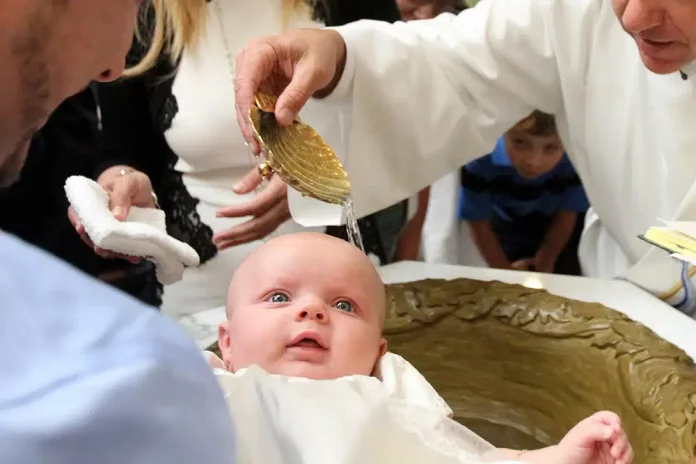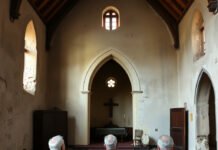Nearly 11 years ago a certain blogger asked to be received into the Catholic Church. The priest requested sight of a certificate of baptism. This document was produced after a quick search of the family scrapbook. It was dated in 1967, when the candidate was still a baby, and signed by a vicar now long dead. The priest studied it briefly, made a note and handed it back. That was all. The certificate of a dead Anglican minister, unsupported by any other evidence, was accepted as proof that the candidate had received a valid Catholic baptism.
The fundamental importance of baptism to the Catholic Church can hardly be overstated. The Code of Canon Law 1983 asserts that baptism is the ‘gateway’ (ianua), not only to the other sacraments, but to Heaven itself. ‘Baptism … is necessary for salvation, either by actual reception or at least by desire’ (canon 849). If salvation itself is at stake, how can the certificate of a non-Catholic minister be sufficient proof that a baptism is valid?
Baptism, like the other sacraments, was ‘instituted by Christ the Lord and entrusted to the [Catholic] Church’ (canon 840). As the Divinely appointed trustee of the sacraments, ‘only the supreme authority in the Church [i.e the Pope, with or without the College of Bishops] can approve or define what is needed for their validity’ (canon 841).
As baptism is necessary for salvation it may have to be administered in extremis, when the candidate is in imminent danger of death – or indeed, where the minister is in danger of death, e.g in a war zone. Canon 871 provides that ‘if aborted foetuses are alive, they are to be baptised, if this is possible’. This in turn demands that, in a case of necessity, any person may administer the sacrament, not just an ordained or licensed minister (canon 861(2)). Even an unbaptised person, let alone a non-Catholic minister, can validly baptise.
Baptism cannot be repeated (canon 845(1) and canon 849). However, canon 845(2) provides that ‘If after diligent enquiry a prudent doubt remains as to whether [baptisms] have been conferred at all, or conferred validly, they are to be conferred conditionally’.
This wording makes clear that, notwithstanding the fundamental importance of baptism, clergy may not conditionally baptise pro maiori cautela i.e from an abundance of caution or ‘just in case’. There must be an investigation and a reasonable doubt.
Canon 845(2) does not mention the obvious possibility that investigation may reveal, not a reasonable doubt, but rather a certainty that what happened was not a valid baptism. In such a case, of course, the candidate must be baptised absolutely, not conditionally.
The either / or wording of canon 845(2), ‘conferred at all, or conferred validly’, is potentially confusing. A commentary suggests that ‘2 types of doubt may arise, about
[1] the fact of baptism and
[2] [its] validity’
(A New Commentary on the Code of Canon Law, eds Beal, Coriden and Green (2000), p.1057).
Does this mean that a purely theological doubt [2] may remain even if all relevant facts [1] are known with certainty? If yes, then canon 845(2) is hard to reconcile with canon 841 (quoted above), which asserts the Church’s God-given jurisdiction to ‘approve or define what is needed for … validity’. The Church cannot turn a doubtful fact into a certainty. (Infallibility is not omniscience!) However, if all the facts are known, it is argued that there is no room for doubt, and therefore no scope for conditional baptism. There is either a valid baptism or there is not. The Church is not merely entitled but bound to decide the question. Otherwise, it is arguably failing in its God-given function. (A judge cannot refuse to decide a case that is within his jurisdiction.)
The canon law of conditional baptism was settled long before audio-visual records were possible. Even in 1983 audio-visual records of baptism would have been very unusual. Audio-visual records are capable of supplying a higher degree of factual certainty than written records and imperfect memories. Therefore they reduce the scope for conditional baptism.
The 1983 Code contains safeguards of the validity of baptism. Canon 846(1) provides that ‘the liturgical books … are to be faithfully followed in the celebration of the sacraments … no one may on a personal initiative add to or omit or alter anything in those books’. Baptism must normally be administered in church, not elsewhere (canon 857(1) and canons 859 and 860). Emergencies must be properly prepared for: ‘pastors … are to be diligent in ensuring that [lay] faithful are taught the correct way to baptise’ (canon 861(2)).
Baptism in non-Catholic Churches presents 3 difficulties
(1) the aforementioned canonical safeguards cannot apply to such baptisms. As canon 11 points out ‘merely ecclesiastical laws bind [only] those who were baptised in the Catholic Church or received into it’.
(2) non-Catholic Churches do not accept the Pope’s authority to define valid baptism and
(3) the Reformed Churches do not hold the Catholic belief in the necessity of baptism (even though they may permit individual clergy and lay members to do so).
Martin Luther preached justification sole fide, i.e by faith alone. If carried to its logical extreme, this doctrine would render baptism superfluous, or at least deny the validity of infant baptism, requiring that baptism should only be administered when the candidate is old enough to make a personal act of faith.
The English law of baptism is a compromise between the Lutheran and Catholic teachings. Article 11 makes a respectful bow to the Father of the Reformation: ‘that we are justified by faith only is a most wholesome doctrine, and very full of comfort …’. Thus clergy are at liberty to believe, and publicly preach, the Lutheran doctrine.
However, in practice, Anglican clergy are required to apply Catholic teaching on baptism, whatever their individual beliefs. Article 27 accepts that ‘the baptism of young children is … to be retained … as most agreeable with the institution of Christ’. (From 1549 to 1662 there was no adult baptism rite in England.) Canon B22 imposes a duty to baptise babies, as did canons 68 and 69 of 1603. The Book of Common Prayer and the modern canons both provide for emergency baptism (‘when need shall compel’), and for conditional baptism in doubtful cases.
Baptism outside the Catholic Church has been subject of various papal pronouncements over the centuries, but the original Code of Canon Law, promulgated in 1917, made no specific reference to it. The subject was revisited by the Second Vatican Council in its decree Unitatis Redintegratio (‘the restoration of unity’) (1964). This resulted in a new canon of the 1983 Code, canon 869(2), which provides that
‘Those baptised in a non-Catholic ecclesial community are not to be baptised conditionally unless there is a serious reason for doubting the validity of their baptism, on the ground of
[1] matter [i.e the application of water]
[2] the form of the words used .. or of
[3] the intention of the adult being baptised [not babies, obviously], or that of the baptising minister’.
Read it all at Ecclesiastical Law



